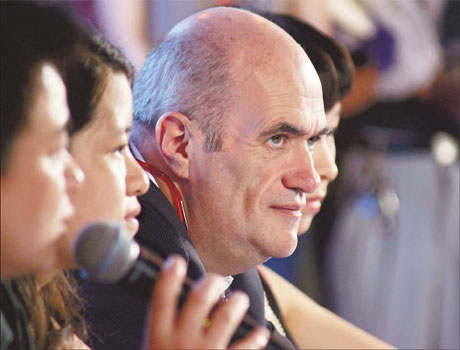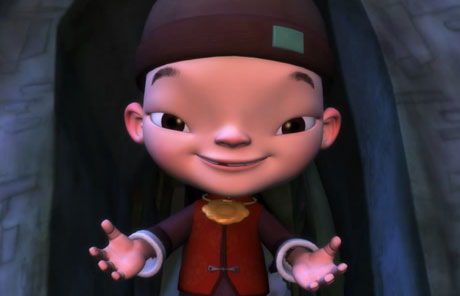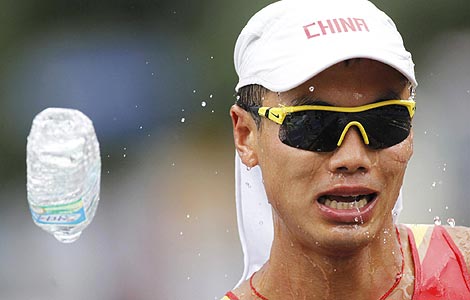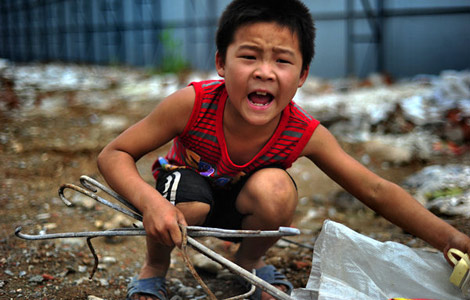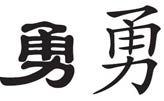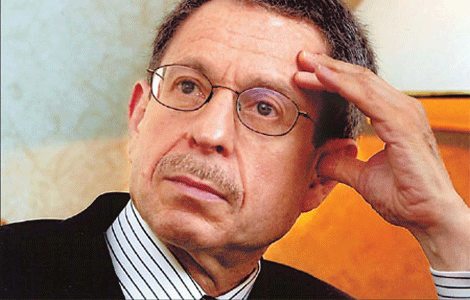Short and sweet
Updated: 2011-08-26 07:56
By Zhang Kun (China Daily)
|
|||||||||
|
Irish author Colm Toibin at the Shanghai Book Fair to promote his short story collection Mothers and Sons. Jing Wei / for China Daily |
Colm Toibin's recent flying visit to Shanghai could open the gates to more translations of short stories in China. Zhang Kun reports.
Colm Toibin had just one free afternoon on a recent visit to Shanghai and decided to visit Shanghai Museum.
It was a repeat visit for the award-winning novelist from Ireland as he is drawn to its collection of Chinese Qinghua (blue underglaze) cera-mics. An art aficionado, Toibin once curated an exhibition of Chinese ceramics at the Chester Beatty Library in Dublin, in 2004.
The 56-year-old writer strolled casually among the vases, pots and bowls, occasionally humming to himself.
Toibin was in Shanghai to introduce his short story collection Mothers and Sons at the Shanghai Book Fair, which ran from Aug 17-23. During his stay he had a public dialogue with local writer Wang Anyi, a book reading session at M on the Bund, and signed books for Chinese readers.
His other books published in Chinese include The Master, a novel based on the life of writer Henry James; and Brooklyn, about a woman who emigrates from Enniscorthy, Ireland, to Brooklyn, New York. The latter won the Costa Novel Award in 2010.
Mothers and Sons is one of a series of six collections of short stories recently published in Chinese by Shanghai 99 Readers' Culture Co Ltd.
"In today's international literary scene, many young prize-winning writers are known for their short stories, while in China, among the large number of translated foreign literature every year, very few are short stories," says Huang Yuhai, president of 99 Readers'.
In response, the 99 Readers' plans to publish 20 collections of short stories annually and ultimately produce the largest collection of contemporary short stories from all over the world, Huang says.
Some believe short stories are just preparation for bigger projects, such as novels, but Toibin disagrees.
When writing a novel, authors have plenty of time to develop their stories and characters, but for a short story, every paragraph carries a lot of weight and meaning, Toibin says.
China and Ireland share a similar history, he said at his open meeting with Wang Anyi, as both were invaded by their neighbors in the past.
Writers struggle to emerge from the difficulties of the past, Toibin says. He was brought up under the strict censorship of the Catholic church, and as he grew up, the censorship stopped and lots of books poured in to the market, from Balzac to D.H. Lawrence.
"It was a similar period in China in the early 1980s," he says.
Wang, who teaches creative writing at Shanghai's Fudan University, asked Toibin whether he believed one can learn and be trained to be a good writer.
Talent cannot be taught, Toibin answered, though "you can teach (students) how to edit their own work through rewriting".
"When you recognize an exceptional talent, you inspire them and encourage them to keep writing," says Toibin who previously taught at Stanford University. "Writers are like athletes, the more they write, the better they'll become."
Toibin admits that it is ambition that spurs him to write. His novel, The Master, portrays Henry James before he wrote his great novels.
"It was emotionally interesting to me - he was not successful yet, he had lost his loved ones, all he had was his work," Toibin says.
As he wrote the book, he felt as though he was speaking through the voice of the writer from 100 years ago.
When he visited the former residence of Henry James, he felt everything was so familiar it was as if he had been there before.

